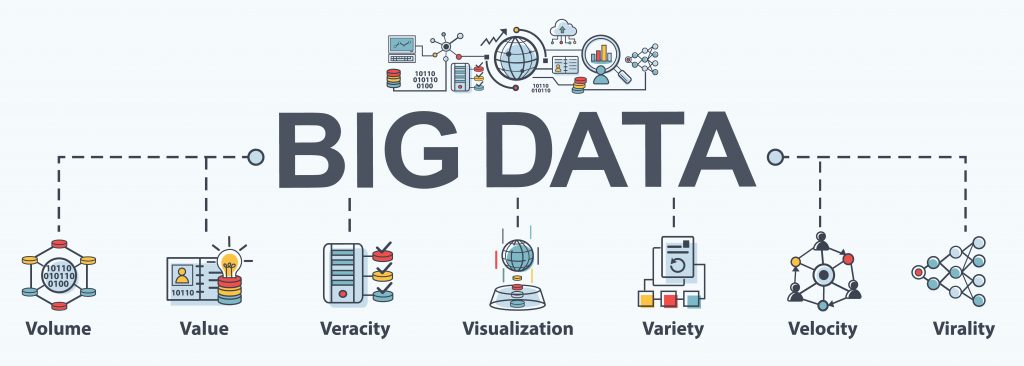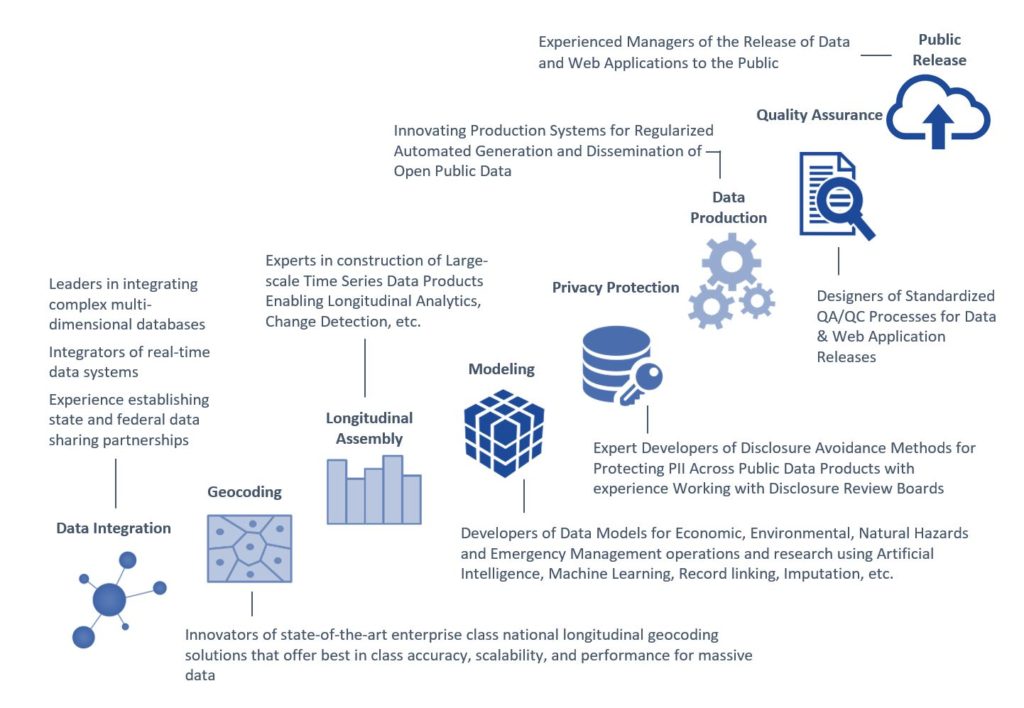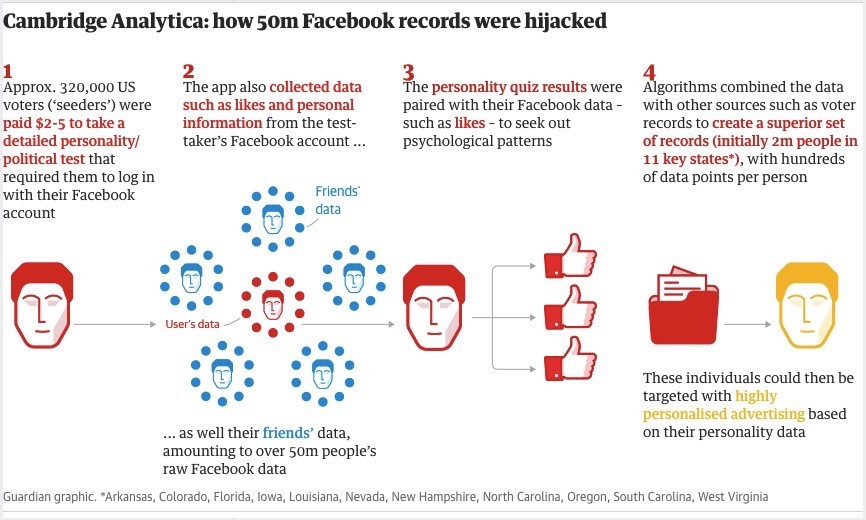
Digital marketing has changed massively in the past couple of years. With dozens of new and evolved pieces of technology being . applied on a daily basis, chances that you’ve missed a few are pretty high. It would be relatively impossible to list all the micro and macro scenarios in which technology has been applied to digital marketing in the past couple of years, but it’s relatively safe to say that the usage of data has been the most prolific and tangible example of technology being applied to any form of marketing.
Let’s analyze why big data and data science are groundbreaking and highly performing strategies today.
What is Big Data?
In order to analyze why this technology has been so well-performing, a clear explanation of the matter is mandatory. Big data refers to the usage of numerical values that are associated with a user, to better understand how and why they are landing on a website, an application or a piece of software. These values are then generally processed via complex Python-based pieces of software which are giving data scientists (professional figures who are analyzing this data) a clear insight for marketing strategies and more.
When a numerical value is associated with a user, this union is called “data point”. But we’ll get to it in a minute…

The Transition From Technology To Marketing
In all honesty, it’s quite hard to understand how data could be used for any marketing strategy, but the process which applies data points to marketing could be summed up using one single word: “personalization”. Ever you ever landed on a site that asked you for “personalization consent for ads and features?”.
Well, chances that the site you’re browsing is using some form of the big data-based tool are pretty high. In this case, the data which is acquired via the above-mentioned tool could be used to personalize a catalog, for example, bringing the items which are very likely to convert into a sale to the top, in order to increase its conversion rate. Given the fact that this happens automatically for every user which accepts the terms, it’s easy to understand why this could become an ROI machine for eCommerce portals with loads of traffic and different audiences.

The Cambridge Analytica Scandal
Before 2018, the usage of data points was merely a theoretical matter, associated, practically, with big enterprises like Amazon and Facebook, who were using big data merely for development purposes. In 2018, the Cambridge Analytica scandal changed this forever, bringing big data applied to marketing (especially when digitally-focused) to the mainstream. Extremely well covered in Netflix’s own docu-film “The Great Hack”, the Cambridge Analytica scandal was related to the infamous buying from the British company of data points directly from Facebook, which was then used to better target ads for both the Brexit campaign and the Trump presidential one.
How Did The Scandal Change The World Of Digital Marketing Forever
It’s quite hard to summarise all the events which led to a $1.2 Billion fine for both Facebook and the Cambridge Analytica company, but it’s relatively simple to explain why this event changed the world of marketing forever.
Before the usage of data points was “opened” to a mainstream audience, as mentioned above, big data applied to users was merely used to prepare a specific software development task or something which was only falling within the development world. Given the fact that Cambridge Analytica was able to access over 75% of the electors’ data before planning their ads, it’s quite easy to understand the power which lies within the usage of data for marketing purposes. 2018 was considered “Year 0” for marketing automation and data regulation for this very matter.

What Happened Next
As many of you are aware, GDPR was enrolled shortly after the Cambridge Analytica scandal and it actually was including a specific section in regards to the usage of big data for marketing purposes. Since GDPR was fully enrolled last May, it is now mandatory to declare when and why data is acquired on any device, landing page or piece of software, with a full user discretion for confirmation. You can, as of today, in fact, refuse to give your data to almost any site. GDPR is still being processed and updated and, given how many companies still have refused to adapt to its guidelines, we can safely say it will become even more strict in the next couple of months/years.
Is Big Data-Oriented Marketing Just An Enterprise Matter?
It is not. Big data and data-oriented marketing aren’t something that applies just to big companies but is, indeed, something which every small business with a clear online and digital focus could use. There are dozens of eCommerce companies that are using big data tools and personalization-related ones that are legally and legitimately acquiring data from users and many of these are far below the numbers of players like Amazon and Twitter. In 2019, data science applied to marketing has become a friendly matter for companies of every size.
Should My Company Approach Data Science For Marketing?
In order to understand whether if a data science strategy could have any positive application within your company, it’s important to understand and evaluate if the audience which is browsing your site/using your application or software is so diverse for which a form of automatic understanding of how they operate would be required.
In all honesty, it’s almost impossible to hypothetically trace whether a data-oriented marketing strategy should be applied to a business, but overall it’s known that fast fashion companies and financial related businesses are the ones that benefit the most from these. Data science, as of today, is relatively inexpensive if properly set up within a small team, with dozens of tools available online for as little as £99 p/month.
Tips And Tricks For Data Science Applied To Marketing
As many of you are aware of, digital marketing divides itself in (mainly) two types of strategies: paid and organic. With paid strategies, we intend the usage of ads on platforms like Facebook and Google, whilst organic ones refer to the usage of SEO copywriting/link building and general content writing or PR. Big data could be beneficial for both these strategies, from being able to automatically target certain audiences with the usage of data points to better content writing based on the keywords users are using when writing on your site’s search box.
In the first case scenario, using data would give you a clear insight towards what the audience you want to target normally browses for: “Given the data we’ve acquired, we know that the audience we are targeting is very likely to click on ads which use this or that keyword, we should keep this in mind when planning our ads!”. In regards to copywriting and other forms of content on your site, having specific keywords to target would speed up all the keyword research processes which normally take a lot of time, whilst delivering far better results, which are backed up by precise data and not suppositions.
The Market Value
Data in marketing, sales and other forms of businesses have all been used by Amazon and its companies for a total of over $4 billion in the past 4 years. This, given the number of ads that these companies run on a daily basis, gives us a clear insight into how powerful the usage of big data for marketing purposes is and how big its development will be in the nearest future. As mentioned above, data science for marketing could be approached by almost any business, regardless of its size and, given how the market is almost tunnel visioning itself towards this matter, we can safely say that this is going to become the biggest marketing trend before 2022.
Some Risks Factors
Using big data for marketing strategies isn’t all easy and clear. There are a variety of risks which should be taken into consideration when approaching data science for marketing purposes:
– Data-oriented marketing doesn’t involve a clearly fundamental creative part when it comes to launching a campaign. Having an extremely well-targeted audience means nothing if the ads/content aren’t well written or bland. It’s important to use data to avoid excessive spending, but keep in mind that data is a guideline, not your overall strategy.
– The usage of data highly relies on its acquisition. The data which is given to you by Facebook won’t definitely be precise, as, otherwise, it would mean that the company is effectively providing you with guidelines on how to give them less money with a higher conversion rate for your ads, keep that in mind!
– Having a data scientist in-house, especially if you are a small business, could be highly expensive but extremely worth the investment. In 2018, the data scientist figure was the most requested within the technology business world.
The Usage Of Big Data For Mobile Purposes
As many of you are aware, mobile traffic has surpassed the one on the desktop by over 10% last year, which led many app developers into looking at different data-oriented architectures in order to improve the connection (and, therefore, the marketing) of online portals worldwide.
There are tons of potential applications of data for marketing, even from an architectural point of view: if you think about the fact that mobile devices are connected to the internet (most likely) 24/7, you can (potentially) acquire extremely big influxes of data (only if the users are fine with it) constantly. This is something which companies like Apple are doing already, especially after the release of iOS 12, considered the most data-driven OS in history.
To Conclude
Data and marketing aren’t two separate things anymore. With signals like the ones which have been pointed above, it’s safe to say that the usage of data will revolutionize the world of marketing, becoming more and more prominent every year, with dozens and dozens of new tools available on the matter. If you’re looking to implement data-driven strategies to your business, 2020 will be the prime time to do it, given how architectures are moving towards data-oriented modeling.
It’s estimated that the usage of data will grow by at least 25% in the first half of 2020, becoming an industry-standard in digital agencies worldwide. If you’re a developer with a strong Python knowledge or a digital marketer with a keen interest in development, you should consider approaching the world of data science, as there are plenty of opportunities there. With this being said, hopefully, this article clarified how data has become an asset so important in 2018, and, most importantly how it set the foundation for future development in the next couple of years. Whatever will happen with GDPR and other legal entities, the future is data-driven.
About the Author:
Paul Matthews is a Manchester-based business and tech writer who writes in order to better inform business owners on how to run a successful business. He’s currently consulting some app developers in Manchester. You can usually find him at the local library or browsing Forbes’ latest pieces.


